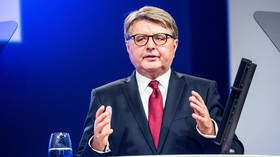Germany becoming ‘a developing country’ – stock exchange boss

Germany is on the way to becoming a “developing country,” the head of the national stock exchange has claimed, blaming Chancellor Olaf Scholz’s “lack of leadership” for economic problems.
Theodor Weimer, chief executive of Deutsche Boerse, was cited by The Telegraph on Monday as saying that Scholz’s ruling coalition was driving international investors away from Germany.
In a speech to Wirtschaftsbeirat Bayern, a Bavarian business lobby group, Weimer said: “I don’t want to spoil your evening, but one thing is clear: our reputation in the world has never been so bad.”
The speech was reportedly made in April but only became known to the public after being posted by Wirtschaftsbeirat Bayern on social media on Friday. It has since been widely shared by conservatives and right-wing economists, who have long been highly critical of the coalition’s policies.
Weimer criticized Scholz’s deputy, Economy Minister Robert Habeck, with whom he said he had held 18 meetings, calling him a “sheer catastrophe.”
“What kind of government are you actually running?” Weimer decried.
According to the chief executive, international investment was only flowing into German companies because they were so undervalued. “We’ve become a junk shop,” he argued.
Weimer also blasted the government for “destroying” the country’s vital auto industry, pointing to the planned phase-out of petrol and diesel cars.
When asked by the Alternative for Germany (AfD) party’s Jurij Kofner, who was present at the event, whether the rise of the hard right was impacting business confidence, Weimer responded: “The fact that there are right-wing populists is not an issue for us professionals at the moment.”
Germany’s ruling coalition was soundly beaten by opposition parties in Sunday’s vote for the EU Parliament, coming in behind the conservatives and the right-wing AfD, according to exit polls.
Scholz’s center-left Social Democrats (SPD) received around 14% of the vote, down from 15.8% in 2019, marking their worst result in decades. The conservative center-right main opposition, the Christian Democratic Union (CDU) and the Christian Social Union (CSU), is predicted to take first place with around 30%. The AfD rose to second place with around 16%.













